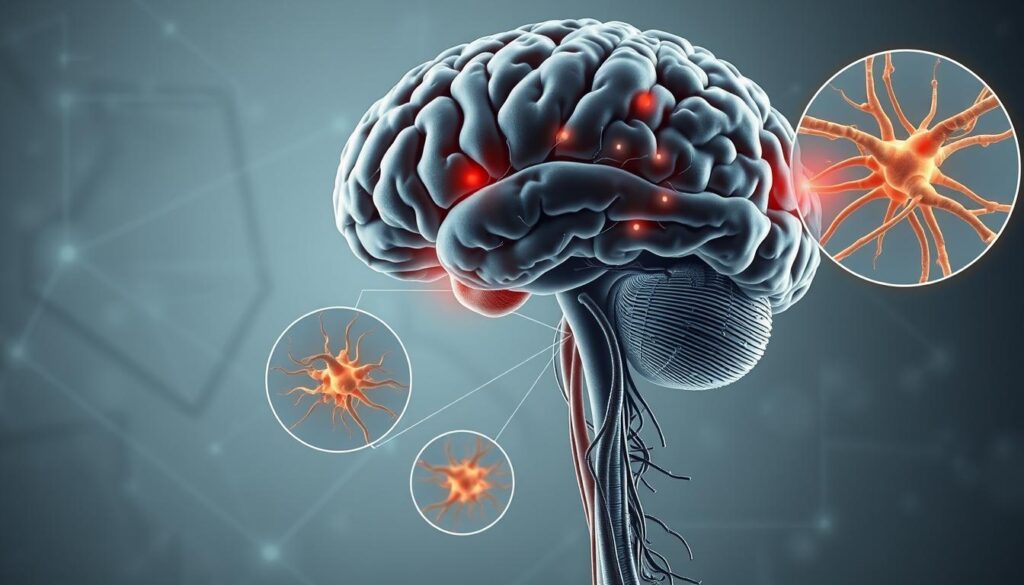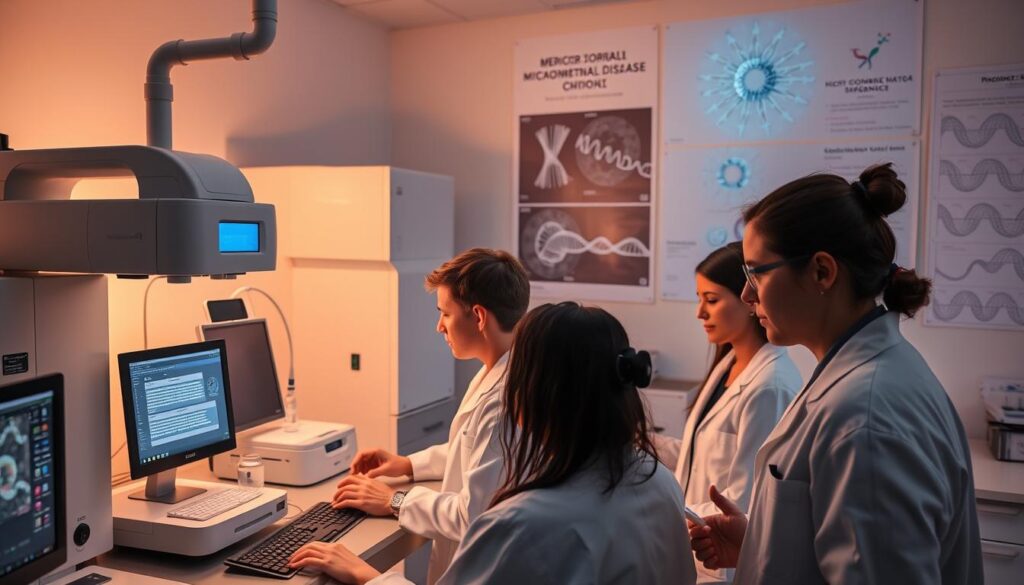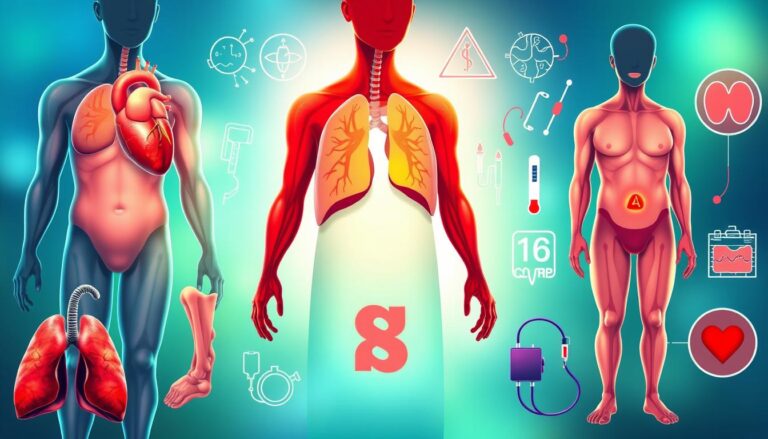Unexplained muscle weakness and fatigue have you ever experrienced this? It could be a sign of mitochondrial disease.
Often this? condition is misdiagnosed and the possibility of mitochondrial disease being the cause is overlooked. Mitochondrial disease arise from problems in the Mitochondrial the energgy-producing cells of our cells.
These diseases hit organs that need lots of energy, like the brain and muscles. Knowing the symptoms is key for early treatment and care.
Key Takeaways
- Mitochondrial diseases start from problems in mitochondria.
- They can affect many body systems, especially those that need a lot of energy.
- Spotting the symptoms early is vital for quick action.
- Muscle weakness and fatigue without a clear cause might mean mitochondrial disease.
- Even without a cure, managing symptoms can make life better for those affected.
Introduction to Mitochondrial Disease
Mitochondrial disease affects the mitochondria, the energy centers in our cells. These mitochondria are vital for powering our cells. When they don’t work right it shows in many ways, like mitochondrial illness indicators in our bodies.
This disease can mess with how cells work. It shows up as mitochondrial dysfunction warning signs in different parts of our body. Especially in organs that need lots of energy like the heart brain, and muscles.
Since every cell needs mitochondria for energy symptoms can be wide ranging. Spotting mitochondrial illness indicators early is key for quick diagnosis and treatment. Symptoms like chronic fatigue, muscle weakness or complex neurological issues help doctors understand the disease better.
Also, knowing mitochondrial dysfunction warning signs is important. These signs are key to spotting the disease’s start and how it’s growing. They help doctors act fast to help patients.
What Are the 4 Symptoms of Mitochondrial Disease?
Mitochondrial disease shows up in many ways, affecting how our bodies work. It’s important to know the main symptoms to get help early. The main symptoms are muscle and brain problems. Knowing these signs helps in managing the disease better.

Muscle Weakness and Fatigue
Muscle weakness and fatigue are key symptoms. People often feel very tired even after doing little. This weakness can also make it hard to do physical activities without getting very tired.
How bad these symptoms are can vary from person to person.
Neurological Symptoms
Neurological symptoms of mitochondrial disease can really affect daily life. Seizures are common and can mess with brain function. People also experience memory loss, trouble focusing and feeling confused.
These brain symptoms are a big part of the disease. They show why getting a full medical check-up is so important.
Muscular Issues
Mitochondrial diseases can cause big problems with muscles. This includes muscles in the face and throat. It makes swallowing and speaking hard.
Difficulty Swallowing and Speaking
Mitochondrial myopathy can make swallowing hard, known as dysphagia. It also makes speaking tough, or dysarthria. This is because the muscles get weak.
People with this issue find it hard to talk and eat. It really affects their life quality. They struggle to get enough nutrients and to communicate well.
It’s hard to keep up with nutrition and hydration. Speech therapy and medical help are key to managing these problems. Let’s look at how these challenges affect patients with mitochondrial muscular dysfunction:
| Symptom | Impact | Management Strategies |
|---|---|---|
| Difficulty Swallowing Dysphagia | Risk of malnutrition and aspiration | Diet modification swallowing exercises |
| Difficulty Speaking Dysarthria | Communication barriers | Speech therapy assistive communication devices |
Neurological Manifestations
Neurological symptoms are a big part of mitochondrial diseases. They affect different parts of the brain and nervous system. Vision and hearing loss are especially common caused by nerve and cell damage in the eyes and ears.
These problems often happen together with other symptoms. This makes the disease even more complex.
Vision and Hearing Loss
Vision loss can vary from mild to complete blindness in people with mitochondrial encephalomyopathy. It’s caused by damage to the optic nerves. Hearing loss on the other hand, comes from damage to the inner ear’s nerves and cells.
Both vision and hearing loss can greatly affect daily life and quality of life.

Read more: Neuroestrogens Unlocking Brain Health
Vision and hearing loss often happen with other symptoms like balance and coordination problems. This shows how complex mitochondrial encephalomyopathy is. Symptoms like ataxia and peripheral neuropathy can make things even harder for patients.
They need a detailed plan to manage all these neurological issues.
Cardiac Symptoms
Cardiac issues are a serious part of mitochondrial disease. They show up as arrhythmias or cardiomyopathies. This is because heart muscle cells need energy to work right. These symptoms need careful management to avoid serious problems.
Mitochondrial cardiac symptoms include arrhythmias which are irregular heartbeats. This can cause blood to circulate poorly. People might have tachycardia where the heart beats too fast or bradycardia where it beats too slow. Both are serious health risks and need close medical watch.
Cardiomyopathy is another big issue. It’s a disease of the heart muscle that can cause heart failure. In mitochondrial heart disease muscle cells can’t make enough energy. This weakens heart contractions and reduces blood flow. Symptoms like shortness of breath swelling in the legs and feet, and fatigue are common.
Early diagnosis and treatment are key for mitochondrial heart disease. Regular heart checks and the right medical and lifestyle changes can help a lot. Treatments might include medicines or surgery, like pacemaker implantation for severe arrhythmias.
Understanding the heart symptoms of mitochondrial disease is crucial for managing them well. Working together cardiologists and mitochondrial disease specialists can offer the best care. This helps patients live better lives.
Gastrointestinal and Metabolic Symptoms
People with mitochondrial disease often deal with mitochondrial gastrointestinal symptoms. These symptoms can really affect their daily life. They might have severe problems with how food moves through their digestive system. This can cause a lot of discomfort and other issues.
They also face mitochondrial metabolic issues. These can show up as diabetes or problems with the liver. These problems come from the body’s trouble making energy because of mitochondrial problems. Here’s a table that shows some common symptoms:
| Symptom Category | Common Symptoms | Impact on Health |
|---|---|---|
| Gastrointestinal | Severe Dysmotility Abdominal Pain | Poor Nutrient Absorption Weight Loss |
| Metabolic | Diabetes Liver Abnormalities | Blood Sugar Imbalance Liver Damage |
Healthcare providers can do a better job of diagnosing and treating mitochondrial disease if they know these symptoms. It’s important to tackle both mitochondrial gastrointestinal symptoms and mitochondrial metabolic issues to give patients the best care.
Pediatric Considerations
It’s important to understand the special challenges of mitochondrial disease in kids. Children often face more severe symptoms. So finding and treating them early is key to their health.
Developmental Delays
Kids with mitochondrial disease often have big delays in development. These can affect their ability to move speak, and think. Early help is crucial to improve their chances with special education and therapy plans.
Specialized Pediatric Care
Managing mitochondrial disease in kids needs a team effort. Pediatric care includes genetic advice nutrition therapy, and regular check-ups. This approach helps meet each child’s needs, improving their life quality and future prospects.
Diagnosis and Testing
Diagnosing mitochondrial disease needs a lot of skill and advanced tests. These tests help us understand the disease’s genetic and biochemical roots.

Read more: Top Foods That Help Prevent Heart Disease
Genetic Testing
Genetic testing is key in diagnosing mitochondrial disease. It looks at the mitochondrial DNA for mutations that cause the disease. Next-generation sequencing NGS makes this process more accurate.
This method helps find specific genetic problems. It allows doctors to create better treatment plans.
Biochemical Markers
Biochemical markers in blood urine and muscle tissue are also important. They show if there are enzyme problems or other metabolic issues. For example, high levels of lactate and pyruvate in the blood can point to mitochondrial disease.
Using these tests together helps doctors find the disease early. This leads to better treatment plans and outcomes for patients.
Conclusion
Mitochondrial disease is complex, with symptoms like muscle weakness and fatigue. It also affects the brain and stomach. Spotting these signs early is key to managing the disease.
There’s no cure yet, but good medical care and early diagnosis help. People with mitochondrial disease need careful attention to their symptoms.
Research is uncovering the genetic causes of these diseases. This could lead to better treatments. Genetic tests and markers are crucial for diagnosis and treatment.
As we learn more, new treatments might change how we manage mitochondrial disease. This is exciting for those affected and their families.
It’s vital to teach patients, caregivers, and doctors about mitochondrial disease. This knowledge can lead to better care and support. Awareness helps in diagnosing and managing symptoms early.
While there are still challenges, the progress in genetic research is hopeful. It shows the need for continued research and education in mitochondrial disorders.





